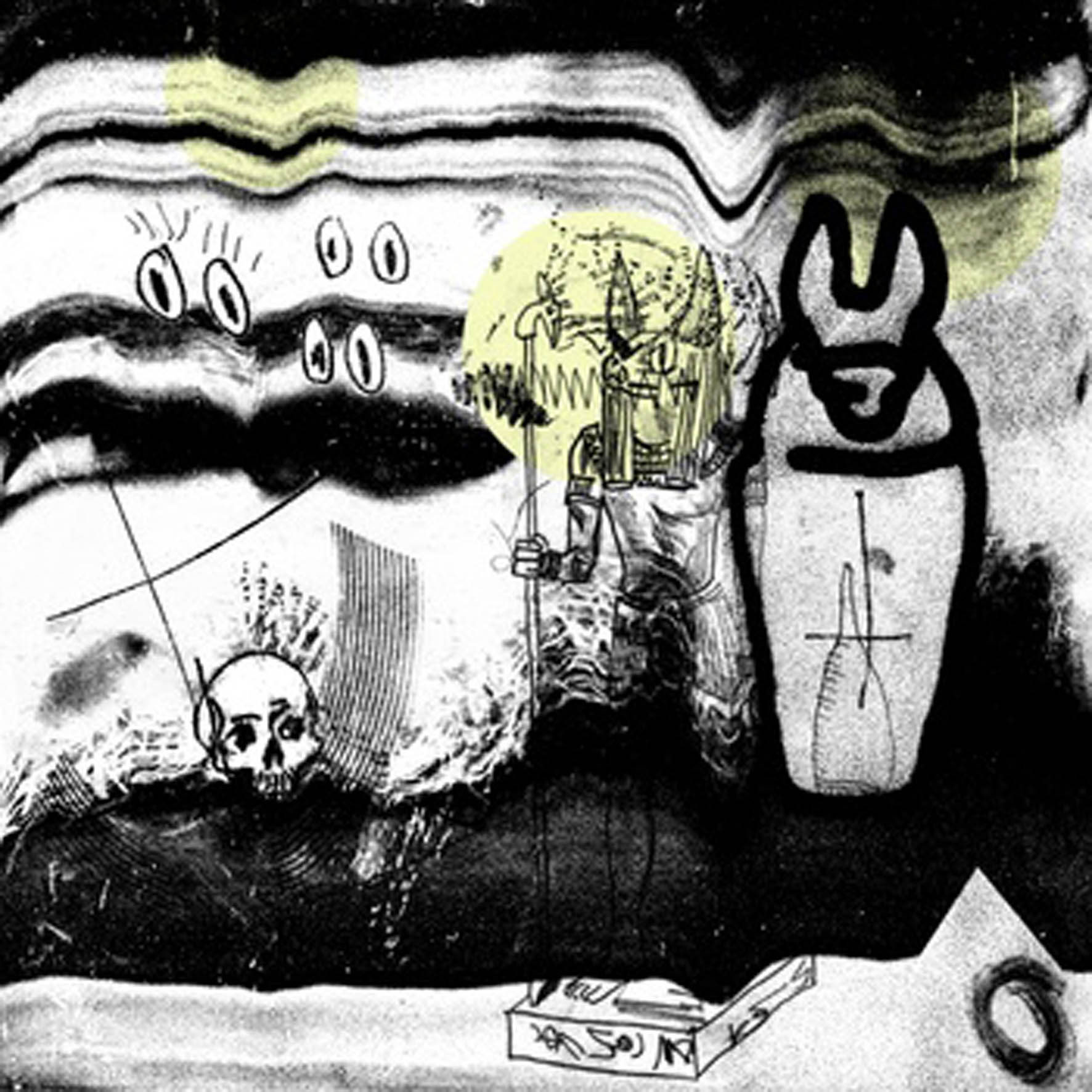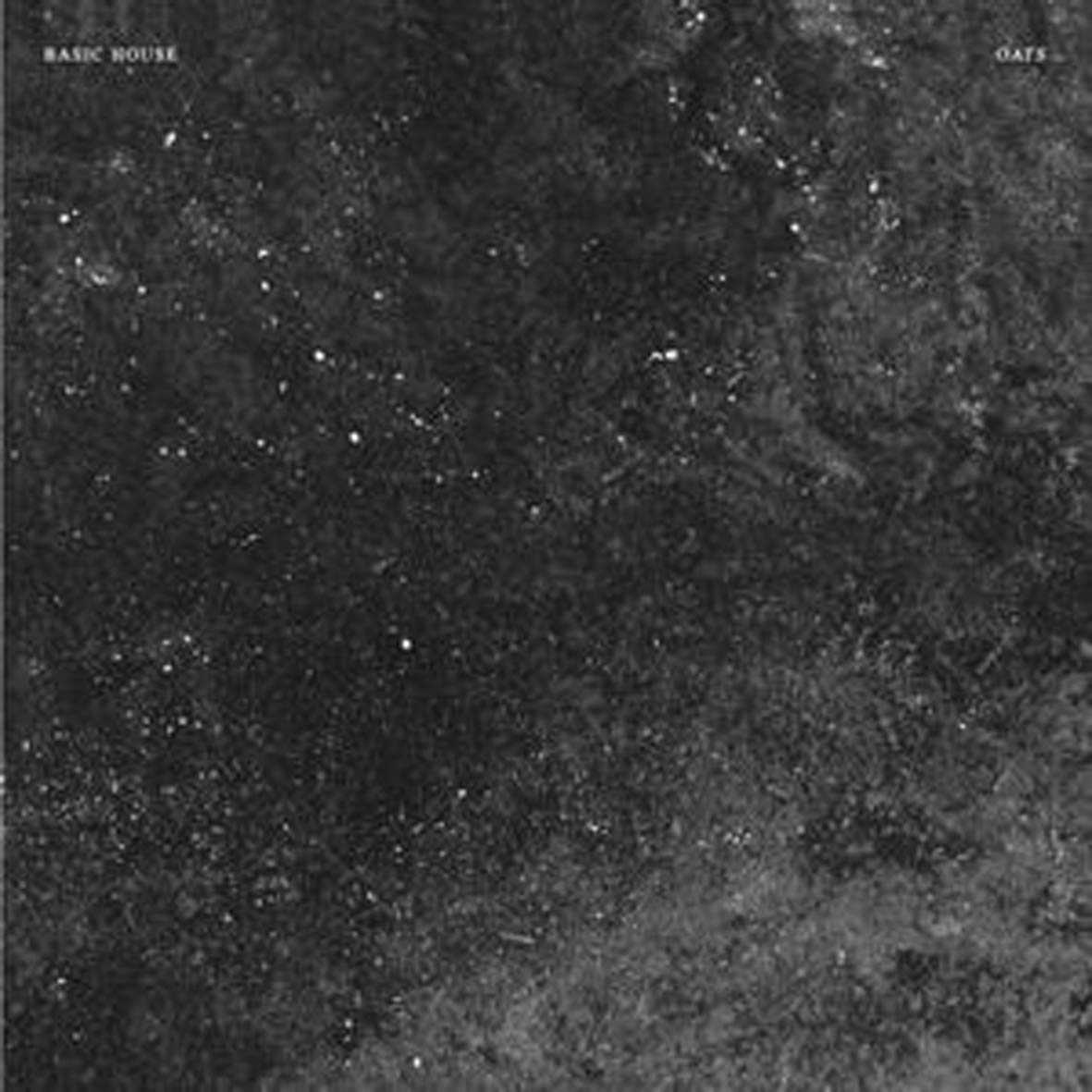Stephen Bishop is best known as the man behind Opal Tapes, but he also releases some very deviant and noteworthy music of his own as the deceptively named Basic House.  While both of these albums were released in 2013, they take Bishop's otherworldly wrongness in two very different directions.  Caim in Bird Form is the much weirder (and arguably more unique) of the two, but the more recent Oats compensates for its comparative lack of derangement by incorporating a heavy noise/industrial influence that yields some impressively brutal results.

Caim has one of the more eerie and wrong-footing openings in my recent memory, as Bishop takes the hackneyed trope of using film dialogue to a bizarre extreme with "Aspirin Telepath."  Aside from some murky, throbbing synths, the piece is little more than a tense monologue pitch-shifted and taken wholesale.  Then that is followed by "I Found U," which opens with a crackling, near-incomprehensible answering machine message.  That message ultimately gives way to something resembling music, but just barely: it features only looped swells of static, a repeating hollow thump, and some uneasy echoing and machine noise.  It is certainly a very sparse and minimalist piece, but it is also quite an enjoyable one, recalling some sort of deep subterranean or sci-fi twist on The Loop Orchestra's mad brilliance.
While part of me hoped the album would continue to sound like an enigmatic radio transmission from deep space forever (or just listening to late night television on lots of hard drugs), the album arguably begins in earnest with the third piece "I Don't Remember Acid."  At the very least, it feels structured and has a clear beat/rhythm of sorts.  Bishop's "songs," however, are not techno/dance in any conventional sense–rather, they are a ruined, rusted, sickly sounding, and grotesque caricature of the genre.  Everything sounds scratchy, queasy, and anemic.  That is, except on the rare occasions when it does not, such as with the bassy, spaced-out dub techno anomaly of "64 Bummer."
While that piece is reassuring in that it shows that Stephen could competently make something more straight-forward if he felt like it, I am (predictably) far more impressed with his more outré excursions, like the blearily dissonant haze of "Field 0.08" or the shivering rhythm in "Ultra-Misted" that gradually degenerates into backwards-sounding whooshes.  Or the beat in the title track, which basically sounds like someone rhythmically sharpening a long knife.
My favorite piece, however, is the closing "TV Illness," which sounds like it appropriates the same string piece used in Severed Heads' "Wonder of All the World."  Bishop takes that beautifully melancholy piece in a very different direction though, as it sounds like it is fitfully reverberating through a cavernous parking garage.  It makes for a very hallucinatory and bittersweet listening experience, which is happily reprised as "In Illness Form," a remix by Scuba Death (the sole real difference being the addition of more hissing and a metallic machine-noise rhythm).
If Caim can be said to have a flaw, it would be that the individual pieces are all based on a few simple, repeating motifs–the sort of thing that other musicians might see as little more than studio experiments or the beginnings of something larger.  That did not bother me at all though, as they cumulatively form one hell of a bizarre and unique album.  Also, anything more elaborate or musical would have ruined my pleasing illusion that these are field recording collages made by a serial killer or madman hiding in a sewer: Caim works so wonderfully precisely because of Bishop's unwavering commitment to his broken, crackling aesthetic of cryptic dispatches.  Stephen certainly recorded some great individual pieces, but Basic House's brilliance lies far more in how it sounds than in the actual beats and notes being played.

Initially, Oats sounds a hell of a lot like its predecessor, as "AR II" offers up a healthy dose of tape hiss and a warbling, obsessively repeating loop.  It quickly makes some surprising updates to Bishop's formula though, as an actual house beat(!) appears alongside some very conventional high-hats and a burbling techno bass line.  That piece turns out to be an aberration in almost every way though, as the rest of the album is rarely that minimal or that straightforwardly musical.  The second piece, "Child Confession," is very much the one that sets the tone of what is to come: dense, murky, crunching soundscapes with subtly hallucinatory synth flourishes and lots of heavy machinery sounds.
The biggest thing that separates Oats from Caim is density: Oats is far more crushing and relentless than broken or crackling.  That difference is embodied nicely by "Interiors," which basically sounds like a fleet of street cleaners plowing through a pig farm.  Such thick, buzzing soundscapes happily make up a significant portion of the album, as Bishop returns to that theme again (minus the pigs) with both "L Wave & Comb" and the roiling factory noise of "Dry Contact."  The remaining pieces are divided up between ominous, pulsing ambient drone ("Time Table" and "Nurse"); haunted, minimalist dub techno variations ("C-Beat" and "La Coccinelle"); and a couple of curious divergences.
The first of Oats' curveballs is "Est Oan," an alternately cartoonish and creepy experiment in pitch-shifted voices amidst brooding dark ambient throbbing and skittering.  The other aberration, however, is the album's masterpiece.  According to Alter's description, "B.G. Feathers" "evokes the grinding power of Maurizio Bianchi's best '80s material," a claim that I will have to take their word for, as I have never heard anything by Bianchi that sounds quite like it.  In any case, it is an absolutely crushing piece and a brilliantly simple one besides: it is essentially just a heavy, endlessly repeating, and blown-out industrial crunch, but the twist is that the crunch is constantly changing in violent ways.  In fact, it often sounds like the tape is literally being shredded, which is an extremely neat trick.  Few things make me happier than gnarled, unrelenting, mechanized crunches at high volume.  It breaks my heart every single day that I do not live in a futuristic dystopia terrorized by mechanized juggernauts, so I deeply appreciate Basic House for at least providing the fleeting illusion of one for me.
Ultimately, Oats hits higher highs than Caim while also being significantly more accessible, as Bishop's more beat-driven pieces offer enough of a semblance of normalcy to probably draw in the more adventurous strain of underground dance enthusiasts (especially given Stephen's role in the scene).  Part of me laments Bishop's evolution a bit though, as Caim in Bird Form was front-to-back otherwordly insanity.  Oats is certainly a logical and impressive leap forward, but Basic House's newfound force and quasi-professionalism necessarily comes at the expense of some of its its rickety predecessor's "outsider art" charm.  I still love both though.
 
 
Read More

